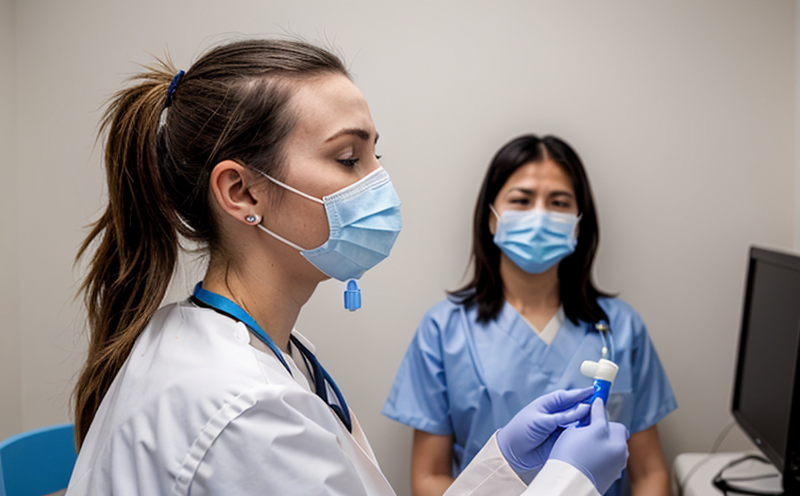Molecular Detection of Respiratory Viruses in Horses
The molecular detection of respiratory viruses in horses is a critical diagnostic tool used to identify viral pathogens responsible for respiratory diseases. This method leverages advanced nucleic acid amplification technologies, such as polymerase chain reaction (PCR), which allows for the sensitive and specific identification of viral sequences. The significance of this test lies in its ability to provide rapid diagnosis, aiding in timely treatment decisions that can significantly impact a horse's recovery.
Respiratory diseases in horses are often caused by various viruses including equine herpesvirus (EHV), influenza virus (Equine Influenza Virus, EIV), and rhinopneumonitis virus. Early detection of these pathogens is essential for preventing the spread of infection within stables and to other animals. The molecular test can differentiate between different strains of viruses that may have varying degrees of pathogenicity and transmissibility.
Sample collection typically involves swabs from the nasal passages, which are then processed in a dedicated laboratory setting using standardized protocols. These protocols ensure consistent results and compliance with international standards such as ISO 15189 for quality management systems in laboratories. The use of advanced instrumentation like real-time PCR machines guarantees accuracy and precision in detecting viral loads.
Results from molecular detection are usually available within a few hours, providing rapid feedback to veterinarians and horse owners. This timely information is crucial for initiating appropriate treatment regimens such as antiviral medications or supportive care measures aimed at reducing inflammation and enhancing immune responses.
The importance of accurate diagnosis cannot be overstated; incorrect assumptions about the nature of an infection could lead to inappropriate treatments, prolonged illness, or even fatalities in severe cases. By employing molecular techniques early on, we ensure that horses receive targeted therapies based on actual pathogen presence rather than presumptive diagnoses.
Regular monitoring through routine testing helps maintain herd health by identifying potential outbreaks before they become widespread issues. Additionally, this approach supports biosecurity measures designed to protect equine populations from exotic diseases like African horse sickness virus (AHSV).
In summary, the molecular detection of respiratory viruses in horses represents a cornerstone technology for effective management strategies against these debilitating conditions. Its role extends beyond mere diagnosis; it enables proactive interventions aimed at minimizing suffering and preventing further spread among susceptible hosts.
Why It Matters
The timely identification and accurate characterization of respiratory viruses in horses are paramount to effective disease management. Rapid diagnosis allows for early intervention, which is crucial in limiting the scope and duration of illness. Accurate information about the specific viral agent helps tailor therapeutic approaches more precisely, thereby improving outcomes.
- Reduces transmission: By promptly identifying infected individuals, further spread can be minimized within the population.
- Promotes recovery: Early treatment increases chances of full recovery and reduces complications associated with prolonged infections.
- Supports biosecurity efforts: Routine testing contributes to overall farm health by detecting potential threats early on.
Moreover, understanding the epidemiology of respiratory diseases aids in formulating targeted prevention programs. For instance, knowing which viruses are prevalent can guide vaccination schedules and environmental controls within facilities.
In conclusion, molecular detection plays an integral part in safeguarding equine health by providing essential insights into pathogen presence and activity levels.
Eurolab Advantages
At Eurolab, our commitment to excellence ensures that every test conducted meets the highest standards of accuracy and reliability. Our state-of-the-art facilities are equipped with cutting-edge technology tailored specifically for respiratory virus detection in horses.
- Expertise: Our team comprises highly skilled professionals who specialize in molecular diagnostics. They stay abreast of emerging trends and technological advancements to deliver the most effective solutions.
- Compliance: We adhere strictly to international standards such as ISO 15189, ensuring that all procedures comply with rigorous quality assurance protocols.
- Speed: Leveraging advanced instrumentation allows us to process samples quickly and deliver results efficiently without compromising on precision.
The combination of these factors makes Eurolab your trusted partner in achieving optimal health outcomes for your equine herd. Our dedication to providing accurate, reliable, and timely information underscores our unwavering commitment to delivering value-added services.
Why Choose This Test
- High Sensitivity: Molecular detection offers superior sensitivity compared to traditional methods like culture or serology tests. Even trace amounts of viral RNA/DNA can be detected.
- Rapid Results: With modern technology, results are available faster than ever before, enabling quicker response times.
- Precision: Advanced instrumentation ensures highly precise measurements leading to more accurate diagnoses.
The molecular detection of respiratory viruses in horses provides numerous benefits over conventional methods. It enhances diagnostic accuracy while shortening turnaround times significantly. This results not only in better patient care but also in reduced costs associated with unnecessary treatments or prolonged hospital stays.
By choosing Eurolab for your equine healthcare needs, you gain access to unparalleled expertise and state-of-the-art facilities dedicated solely to delivering top-notch services. Rest assured that when it comes to respiratory virus detection in horses, no detail is overlooked at Eurolab.





